
As woodworkers, we tend to believe A and of wood's lifecycle from tree to completed project. But locked away in dilapidated barn beams, discarded headboards, and demolished houses a treasure trove of lumber awaits its reincarnation as your next project.
There are many reasons to work with salvaged wood. If you're willing to trade sweat equity for value, you can save some hard-earned cash. Or maybe you're after the rustic look in the first place, so the appeal is the salvaged style. Provenance provides another purpose, emphasizing the personal or historical connection to the wood's past life.
Regardless of your reasons, seeking and salvaging lumber takes a practiced eye and a little extra care. Check out our advice on Where to Find Salvageable Lumber, on page 66, and then read on for tips on how to work with the lumber you reclaim.
RENEWING OLD STOCK
Underneath that weathered exterior lies prized lumber ... along with a few gotchas. If you're working that lumber back to raw wood, adding a few additional steps can protect your tools and your health.
First, don't skimp on the safety precautions. On top of generations of embedded dirt, reclaimed lumber might also carry mold, animal feces, or traces of lead paint, all of which become airborne as soon as you start sanding or cutting. Combine a respirator and dust collection to protect your lungs along with goggles or safety glasses to protect your eyes.
Blade-dulling dangers lurk in timeworn wood as well. Tackle them in three major steps before machining the wood to final dimensions at your tablesaw, jointer, and planer:
1. Remove the metal
This story is from the September 2023 - Issue 290 edition of Wood.
Start your 7-day Magzter GOLD free trial to access thousands of curated premium stories, and 9,000+ magazines and newspapers.
Already a subscriber ? Sign In
This story is from the September 2023 - Issue 290 edition of Wood.
Start your 7-day Magzter GOLD free trial to access thousands of curated premium stories, and 9,000+ magazines and newspapers.
Already a subscriber? Sign In
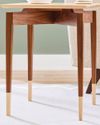
SOCK-LEG TABLE
Build this accent table and try your hand at an uncommon technique for dressing up tapered legs.
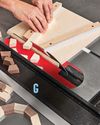
SLED INTO SUCCESS WITH SEGMENTED BOWLS
Start your journey toward creating beautiful bowls with the first critical step: accurately cutting and assembling the angled segments.
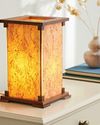
VENEER-SHADE LAMP
Get ready for warm and glowing reactions to this lamp. It makes sheets of veneer and bits from your scrap bin really shine.
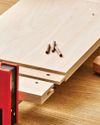
BREADBOARD ENDS DONE RIGHT
This traditional method for concealing end grain relies on a hidden trick to work properly. Find out the \"hole\" story behind breadboard ends with this time-tested method.
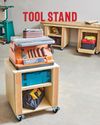
TRANSFORMABLE TOOL STAND
Simple but sturdy, this mobile stand can hold a benchtop power tool. Build two stands and you can stack them or pair them as pedestals for an add-on workbench top.
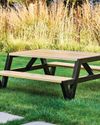
MODERN PICNIC TABLE
Serve up some style at your next cookout or outdoor party with this eye-catching table and bench combo.
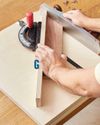
MITER-GAUGE SHOOTING BOARD
Build this shooting board in an afternoon; use it for a lifetime to produce gap-free joinery with just a few strokes of a hand plane.
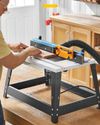
BENCHTOP ROUTER TABLES
Can compact tables deliver big-time routing features and performance? We tested 11 benchtop models to find out.

CLASSIC CHERRY SIDEBOARD
A plywood carcase provides a quick-to-build foundation for the dovetailed drawers and mortise-and-tenon doors.

STUDIO? WOOD SHOP? YES!
Don't mistake this backyard shed as a high-end home for garden tools. Instead, you'll find an efficient, well-lit, and comfortable workshop inside.
